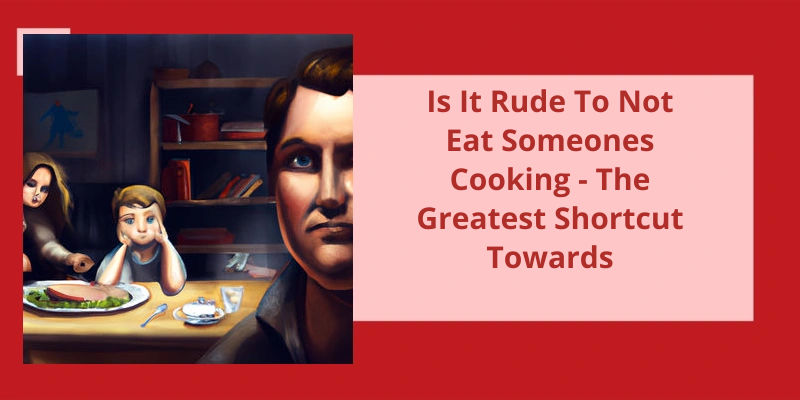It is generally considered rude to not eat someone's cooking. Not only is it a sign of disrespect to the person who put in the effort to prepare the meal, but it can also be seen as an insult to the culture or tradition behind the food. Refusing to eat someone's cooking can be seen as a sign that you don't appreciate the effort they put in or the culture behind the food.
Is it impolite to consume someone else’s food?
It is not impolite to eat off someone elses plate if it is agreed upon by both parties. Sharing food with another person is a sign of trust and friendship, and can be a great way to bond. However, it is important to remember that taking food off anothers plate without permission is incredibly rude and should be avoided.
Is it impolite to take food off of someone else’s plate?
it is important to always seek permission before taking food from someone elses plate. This is a sign of respect and can help to avoid any potential conflict. Taking food without permission can lead to misunderstandings and hurt feelings, so it is best to always ask first.
To sum up, it is important to remember to always ask permission before taking food from someone elses plate. This is a sign of respect and can help to avoid any potential conflict. Taking food without permission can lead to hurt feelings and misunderstandings, so it is best to always ask first. By doing so, you can ensure that everyone is comfortable and that no one is taken advantage of.
Is it impolite to offer leftovers?
It is important to consider who, when, and what the circumstances are when deciding whether or not to serve leftovers. If someone is invited over specifically for dinner, then it is best to not serve leftovers. However, if someone drops by without notice, then it is acceptable to serve leftovers, depending on the relationship between the host and the guest.
To sum up, the decision to serve leftovers should be based on the relationship between the host and the guest, as well as the circumstances of the visit. If someone is invited over specifically for dinner, then it is best to not serve leftovers. However, if someone drops by without notice, then it is acceptable to serve leftovers, depending on the relationship between the host and the guest.
Is it impolite to send back food that you don’t enjoy?
overall, it is clear that sending food back to the kitchen is an acceptable practice if the diner is not completely satisfied with their meal. This is a common practice among dining experts and should be respected by restaurants and customers alike.
sending food back to the kitchen is a perfectly acceptable practice if the diner is not completely satisfied with their meal. This is a consensus among dining experts and should be respected by both restaurants and customers. By following this practice, everyone can ensure that they are getting the best possible dining experience.
Is it impolite to start eating before everyone has their food?
It is important to remember that the etiquette of when to start eating at a table depends on the size of the group. If there are six or fewer people at the table, it is best to wait until everyone is served before beginning to eat.
This etiquette dilemma is highly situational and should be taken into consideration when dining out. When dining with a large group, it is acceptable to start eating as soon as your corner of the table is served. However, when dining with a small group, it is best to wait until everyone is served before beginning to eat.
Is it permissible to consume someone else’s food?
It is important to be aware of the potential risks of sharing food and drinks with others, especially for those with weakened immune systems. It is important to take extra precautions to ensure that the food and drinks are safe for consumption.
To sum up, it is important to be mindful of the potential risks of sharing food and drinks with others, especially those with weakened immune systems. Taking extra precautions to ensure that the food and drinks are safe for consumption is essential for protecting the health of those with weakened immune systems.
Is it impolite to take the food that you brought to a party back home with you?
It is important to remember that when attending a party as a guest, it is not appropriate to expect to take home any leftovers. Unless the host offers to let you take the leftovers home, it is best to leave them behind. This is a sign of respect for the host and their hospitality.
Overall, It is important to remember that when attending a party as a guest, it is not appropriate to expect to take home any leftovers. It is best to leave them behind as a sign of respect for the host and their hospitality. This is a good way to show appreciation for the host and their generosity.
Is it impolite to clear the table while others are still eating?
Leaving the table while others are still eating is considered bad manners. It implies that you were only there for the food and dont value their company. To avoid this, it is important to give a valid-sounding reason for leaving early. This will help to soften the blow and show that you respect the company of those around you.
Overall, it is important to be mindful of your manners when leaving the table while others are still eating. It is best to give a valid-sounding reason for leaving early to show that you value the company of those around you. This will help to ensure that everyone feels respected and appreciated.
If you don’t like the food someone made, what should you do?
It was delicious.”
It is clear that being gracious is an important part of any social gathering. Expressing gratitude and appreciation for the effort and thought put into a meal is a great way to show your host that you enjoyed their hospitality.
Being gracious is a great way to show your appreciation for a meal. Taking the time to express your gratitude and admiration for the dish that was made is a great way to show your host that you enjoyed their hospitality. It is clear that being gracious is an important part of any social gathering.
What are some things that are not considered good manners when eating a meal?
it is important to remember to not call attention to your eating by making noise with your mouth or silverware, not to gesture with your silverware in your hand, and not to push your plate away when you have finished. These are all important etiquette rules to follow when eating in order to maintain a polite and respectful atmosphere.
Eating etiquette is an important part of dining out or in a formal setting. Following the rules of not making noise, not gesturing with silverware, and not pushing your plate away when finished will help to ensure that the meal is enjoyed by all in a respectful and polite manner.
What is the polite way to decline someone’s food?
It is important to be mindful of how you respond to someone offering you food. Saying no, thank you in a firm and assertive tone while making eye contact is a polite way to decline the offer. Additionally, expressing gratitude for the food you have already had is a great way to show appreciation. By following these simple steps, you can politely decline an offer of food while still showing respect and appreciation.
What would be a polite way to say that I don’t care for your food?
Meiers advice is a great reminder that we should always be mindful of our words and how they can affect others. By using a gentler approach when declining an offer, we can show respect and kindness to those around us.
Meiers suggestion to use phrases like “No thank you for now, maybe later” or “Im so full but thank you anyway” is a great way to politely decline an offer without hurting someones feelings. By using these phrases, we can show respect and kindness to those around us.
What would you say to someone if you didn’t like their food?
Offering constructive criticism is an important part of any food service experience. By following the tips outlined in this article, you can ensure that your feedback is heard without causing a food fight. By calling out concerns regarding food safety and giving feedback when asked for it, you can help to improve the overall food service experience.
Constructive criticism is an important part of any food service experience. By following the tips outlined in this article, you can ensure that your feedback is heard without causing a food fight. By avoiding criticism of a first meal and giving feedback when asked for it, you can help to improve the overall food service experience and ensure that everyone enjoys their meal.
Conclusion
In conclusion, it is important to be mindful of the feelings of the cook when declining food. If you are already full, it is polite to politely decline food. However, if the food contains something you are allergic to, or is unhealthy to you, it is perfectly acceptable to pass. It is also important to remember that if you were invited to dinner, not eating can be considered rude.






